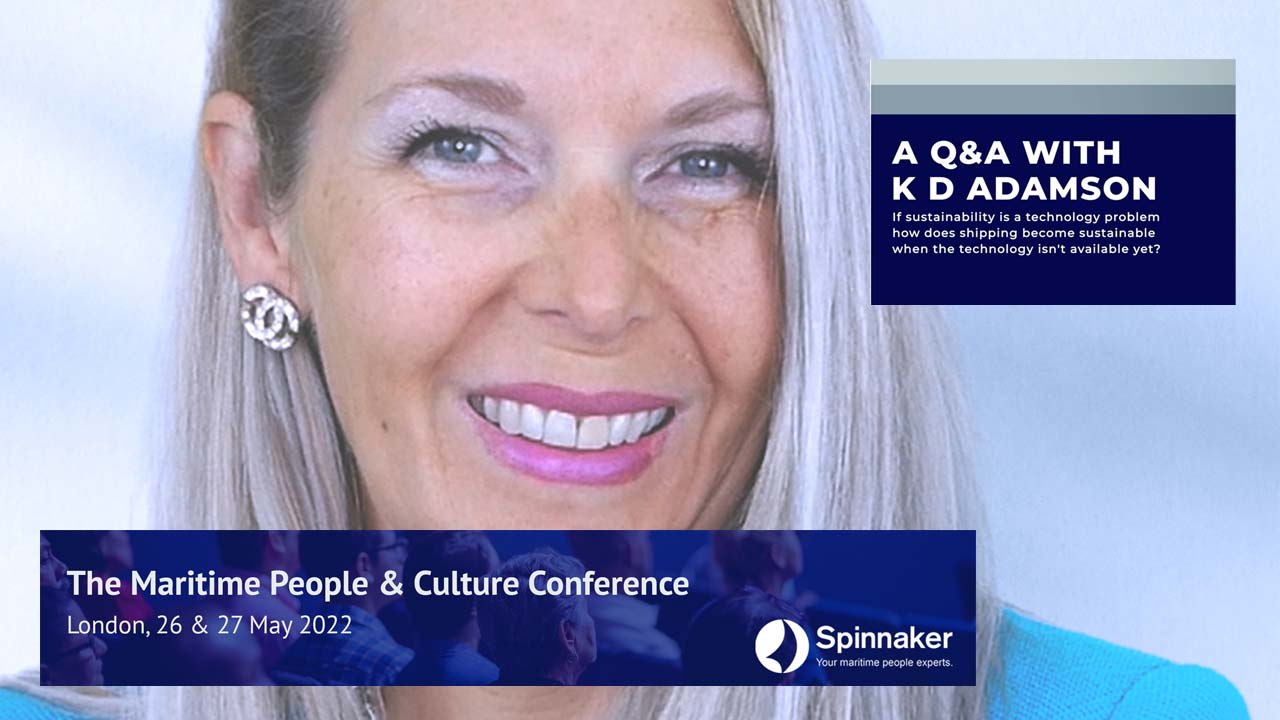Changing Course
Share this blog
Latest Maritime Vacancies
Claims & Insurance Manager (Part-time) – London
Global HR Director – Europe
Operational and Commercial Pricing Analyst- London
Insurance Executive – Singapore
Director – Strategic & Commercial – Europe
If sustainability is a technology problem, how does shipping become sustainable when the technology isn’t available yet? A Q&A with K D Adamson

Ahead of the 2022 Spinnaker Maritime People & Culture Conference we sat down with our keynote and special guest, shipping’s most famous futurist, K D Adamson.
One of the most sought-after futurist speakers globally K D Adamson’s keynotes have been likened to a TED talk on steroids.
With a stellar client list K D has advised organisations in multiple industries from the largest companies to start-ups, and is expert in ESG, agility, leadership, technology, digital and organisational transformation, and the Blue, Green and Circular Economies.
As the world’s foremost maritime futurist her client list spans the ocean industries, and she is renowned for combining visionary thinking, foresight and insight with sharp, straight-talking commercial and business acumen & expertise.
As futurist-in-residence at Futurenautics she works with ship owners, operators & managers, maritime suppliers, policymakers, regulators, technology companies, charities, class, NGOs, banks, VC, port and logistics groups.
We often hear that sustainability is a technology problem, so in the final part of our conversation we asked her how shipping can achieve sustainability if we don’t yet have the technology?
K D Adamson: I think we need to start by defining sustainability. One wise ship owner I work with always says that sustainability is about the business still being around in 30-years time, and he’s absolutely correct. We have siloed sustainability into discussions around decarbonisation and the energy transition, which conveniently becomes someone else’s problem – usually the engineering and technology companies who are supposed to give us a solution.
Where the decarbonisation debate is interesting though is that it highlights what’s really unsustainable in shipping and maritime, and in business more broadly. Back in 1970 Milton Friedman said that the social responsibility of business is to increase its profits, and that’s been the problem that businesses have been trying to solve. How to grow and increase their profits, which has been a zero-sum game. And that overriding need to create profit and growth has shaped our collective attitudes to wider issues of corporate liability and responsibility that decarbonisation is now challenging.
Because companies have sought to limit their liability and their responsibility wherever they can. But sustainability isn’t a zero-sum game, it’s a team sport. Creating a sustainable industry is a systemic challenge, and systemic change is not something that any one company can achieve, or win. So sustainable transformation, as I describe it, is an ecosystem play which is less about control and more about orchestration.
That represents a very different kind of business and leadership mindset, and it’s hard to make that transition. But what makes it even harder is the legal and corporate structures that have been built up over more than a century, which have grown out of those zero-sum game mindsets and beliefs. And now we’re finding that they are working against companies preventing them from operating in a different way. Competition law is a great example of that: we need large industry players to collaborate across ecosystems to drive systemic change but competition law mitigates against them doing so.
This problem is not confined to shipping, but both decarbonisation and the pandemic have exposed the inadequacy of many of the structures which underpin the industry. When it came right down to it these structures that are supposed to support participants and supply chains more widely weren’t fit for purpose, which exposed a staggering lack of collective industry resilience.
I think the shocking treatment of crew during the pandemic, which is now unfolding yet again as a result of the Russia-Ukraine conflict speaks to the disastrously misaligned and often perverse incentives that exist amongst shipping’s stakeholders. These are rooted in the need to limit liability and responsibility for other human beings and non-human species, which has become embedded in the system.
So, it may be fashionable to say that sustainability is a technology problem, but actually not even decarbonisation is a technology problem.
Sustainable transformation is a cultural and systemic issue. And solving it requires a radically different kind of leader, one whose authority doesn’t depend on the ability to control. One who can catalyse and orchestrate large stakeholder ecosystems, with competing priorities.
And to do that you need an iron will, and a guiding purpose that is deeper and broader than just increasing profits.
You can watch the video to accompany this interview with K D Adamson by following this link
The conference takes place on Thursday 26th & Friday 27th May in the City of London, so follow this link now to view the full agenda and book tickets.